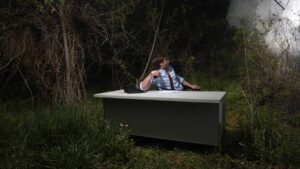Health Check: On Garfield the Cat Day, the biotech sector purrs with deals and breakthroughs

Today's life sciences announcements are the cat's meow, including approval of a game-changing HIV vaccine. Pic via Getty
- Orthocell says its Remplir nerve device blitzes the stitches
- Singular Health inks US physician network deal
- Clarity clearly is undervalued, say brokers
Among other auspicious events, the 19th of June marks the end of slavery in the US, Garfield the Cat Day and the birthdays of former British PM Boris Johnson and royal temptress Wallis Simpson.
So why not add a slew of meaningful life sciences announcements, including an HIV vaccine breakthrough, to the June 19 pantheon?
Let’s start with Orthocell (ASX:OCC) , which reports “compelling data” showing its Remplir nerve repair agent is superior to suture-only standard techniques.
Stitching accounts for circa 90% of the 700,000 nerve repair procedures done in the US annually.
A cuff that envelops the damaged peripheral nerves, Remplir reduces the use of stitching, which can compromise nerve repair.
Orthocell’s study used a rat sciatic nerve injury model, covering 48 rodents across four treatment groups.
These cohorts covered repairs using one, three or six sutures, compared with one suture augmented with Remplir.
The rats’ nerve function and regeneration were evaluated up to 12 weeks post-treatment.
The FDA ticked off Remplir in early April and the device is also approved in Canada, Hong Kong, Singapore, New Zealand and here.
Thus, the study was pitched not so much as approval as supporting the US sales rollout.
Orthocell cites a total addressable market in its target markets of US$3.5 billion, with its already-approved geographies accounting for US$1.8 billion.
The US market is worth US$1.6 billion.
Stem-cell hope for bone marrow transplant patients
NeuroScientific Biopharmaceuticals (ASX:NSB) highlights previous clinical data showing its soon-to-be acquired stem cell platform is effective in preventing graft-versus-host disease (GvHD).
The company is buying the asset, Stemsmart from the unlisted Perth-based Isopogen.
The phase I work covered adults and children with life-threatening, steroid-resistant GvHD, a common complication of bone-marrow transplants.
The data shows the treatment is safe and well tolerated, “with no infusion related toxicities”.
Furthermore, most adults and children had a “complete or partial resolution of symptoms and improved survival”.
Of the 10 children treated on compassionate grounds, all had survived 12 months post implant. Three of them were still alive six years post treatment.
Turning to pancreatic cancer, Amplia (ASX:ATX) reports another patient with a ‘complete response’ in its 55-patient trial dubbed Accent.
As close as dammit to a cure, a confirmed complete response formally is defined as all tumour lesions disappearing, with the effect maintained for at least two months.
“This is a rare outcome in advanced pancreatic cancer where the disease has spread to other parts of the body,” the company says.
A Singularly fine US deal
Imaging medtech outfit Singular Health Group Ltd (ASX:SHG) has signed a $2 million agreement with a US physician network to develop and use Singular’s 3Dicom medical imaging tool.
The compact is with Provider Network Solutions (PNS), covering physician networks in Puerto Rico, Florida, and Texas.
It covers the initial deployment of 1000 3Dicom licences, at US$800 each.
Singular pockets a further US$500,000 on “satisfaction of AI model marketplace and image repository development and integration”.
The company hope to expand to the remaining 30 states that PNS covers.
3Dicom converts magnetic resonance imaging and computed tomography scans to enable “immersive visualisation” with three-dimensional images.
Singular also said it had received $8 million of firm commitments in its recently-announced placement.
Meanwhile, microbiome testing house Microba Life Sciences (ASX:MAP) is on trading halt pending a capital raising.
EZZ girds for US launch
Hitherto China and locally focused, health supplements outfit EZZ Life Science (ASX:EZZ) has launched four initial products into the US after winning FDA approval.
To be sold under the new Ezzday banner, the products are made in the US and are tailor-made for American consumers.
Seeing you asked, the remedies cover de-bloating/de-gassing, vaginal probiotics, skincare and colon detox. Readers can draw their own conclusions as to what that means about the State of the Nation in Trumpian times.
Initially, the products will be sold via Amazon and Shopify.
Locally EZZ sells via more than 600 chemists and globally via 750 ecommerce platforms, including China’s Douyin and Tmall.
The company values the US supplements market at US$100 billion a year, pipping China’s US$80 billion opportunity.
US health secretary Robert F Kennedy Junior (RFK Jr) has a special interest in health supplements, which at the very least shouldn’t harm EZZ’s US ambitions.
EZZ shares have been on a tear – up 33% over the last month – but they are still well shy of the record $5 peak in October last year.
HIV jab spells hope for end to ’45-year pandemic’
Speaking of RFK Jr, the FDA has approved a drug that is meant to protect against HIV with a single administration every six months.
Yep – it’s a vaccine – so maybe the health czar isn’t as avowedly anti-vaxx as we all think.
Marketed as Yeztugo by Gilead Sciences, lenacapavir is seen as the best hope of knocking HIV – in effect a 45-year pandemic – on its head.
Clinicians say the drug is much more powerful than the current oral treatments and almost 100% effective.
“This is a historic day in the decades-long fight against HIV,” Gilead CEO Daniel O’Day said.
“Yeztugo is one of the most important scientific breakthroughs of our time and offers a very real opportunity to help end the HIV epidemic.”
The drug has a list price of US$28,218 ($43,300). But Gilead may provide the vaccine free to non-insured patients.
Have investors underestimated Clarity?
Is radiopharmacy outfit Clarity Pharmaceuticals (ASX:CU6) a case of ‘objects in this rear view mirror are closer than you think’?
Following a series of clinical updates from Clarity, broker Canaccord values the company at $6.74 a share, a lofty 210% increment on the current price.
In March, Wilsons ascribed an even ballsier $8.25 a share.
All things being equal – and they never are – that would value Clarity at $2.6 billion.
Sector champ Telix Pharmaceuticals (ASX:TLX) is worth around $8 billion, bearing in mind it has two FDA-approved prostate cancer imaging tools and a kidney cancer consent in the offing.
Yesterday, Clarity said it has struck an agreement with US mob Spectronrx.
Spectronrx will provide 400,000 patient-ready does of its copper isotope based 64Cu-SAR-bisPSMA (for diagnosing and potentially treating prostate cancer).
In the nuclear medicine game, gaining access to nearby doses is half the battle. But this agent’s generous half-life means it can be distributed across all 50 US states.
Clarity recently announced promising phase II results for 64Cu-Sartate (neuroblastoma) and 64Cu-SAR-Bombesin (PSMA-negative prostate cancer).
Another program, Secure, focuses on identifying and treating metastatic castration-resistant prostate cancer.
Clarity currently has no approved products, but Canaccord expects 64Cu-SAR-bisPSMA to be on market by mid 2027.
“Recent commercial agreements should remind the market that this potential best-in-class asset could be closer than we think.”
The firm reckons Clarity can win a 20% share of the US market, for US$520m in peak sales.
Your columnist’s nuclear science credentials – the ones plucked from a Weeties pack – are out of date.
But it looks like Telix should have one eye on the rear-view mirror and the other on the road ahead.
At Stockhead, we tell it as it is. While Orthocell, Singular Health and EZZ are Stockhead advertisers, they did not sponsor this article
Related Topics

UNLOCK INSIGHTS
Discover the untold stories of emerging ASX stocks.
Daily news and expert analysis, it's free to subscribe.
By proceeding, you confirm you understand that we handle personal information in accordance with our Privacy Policy.








